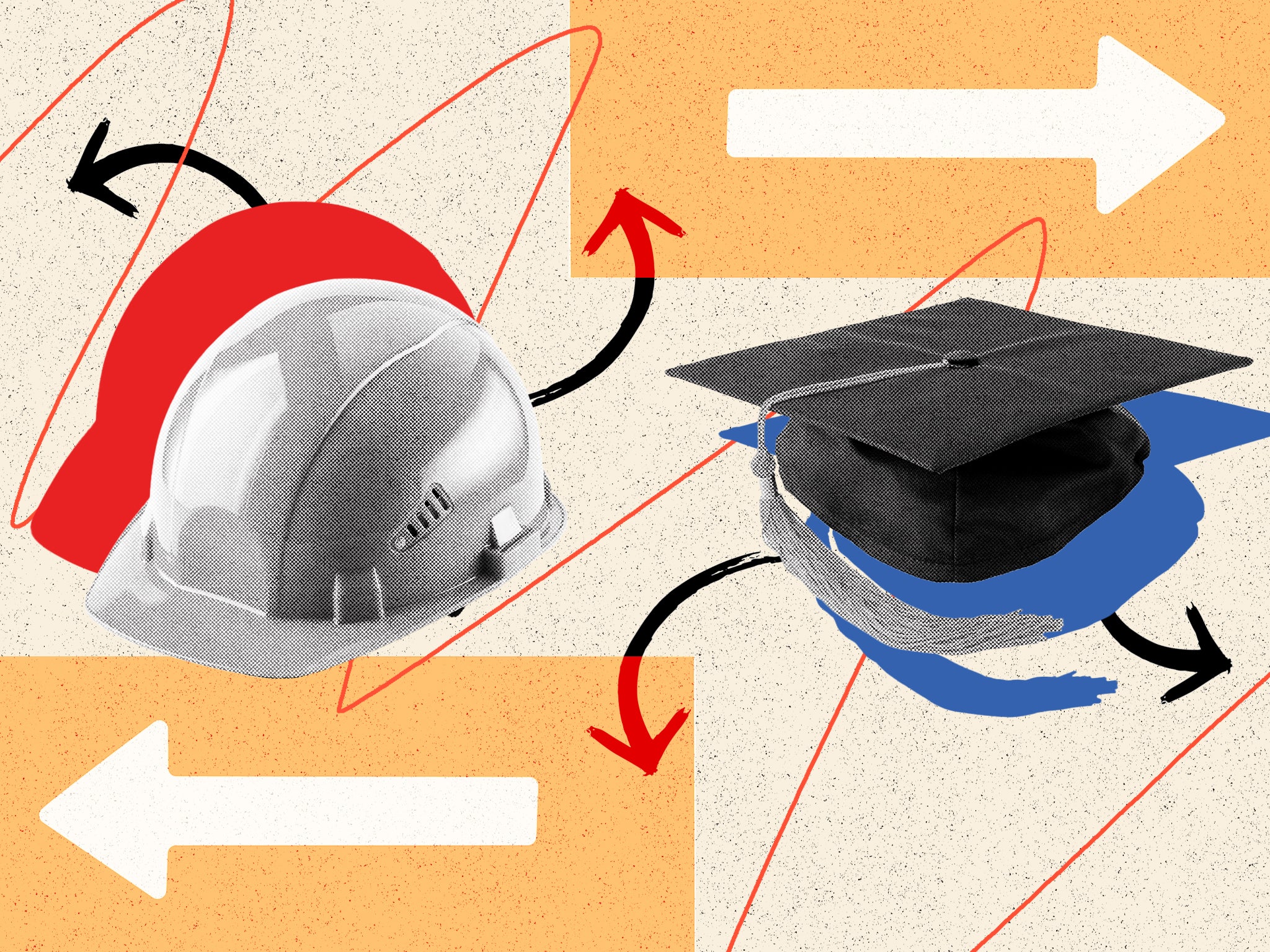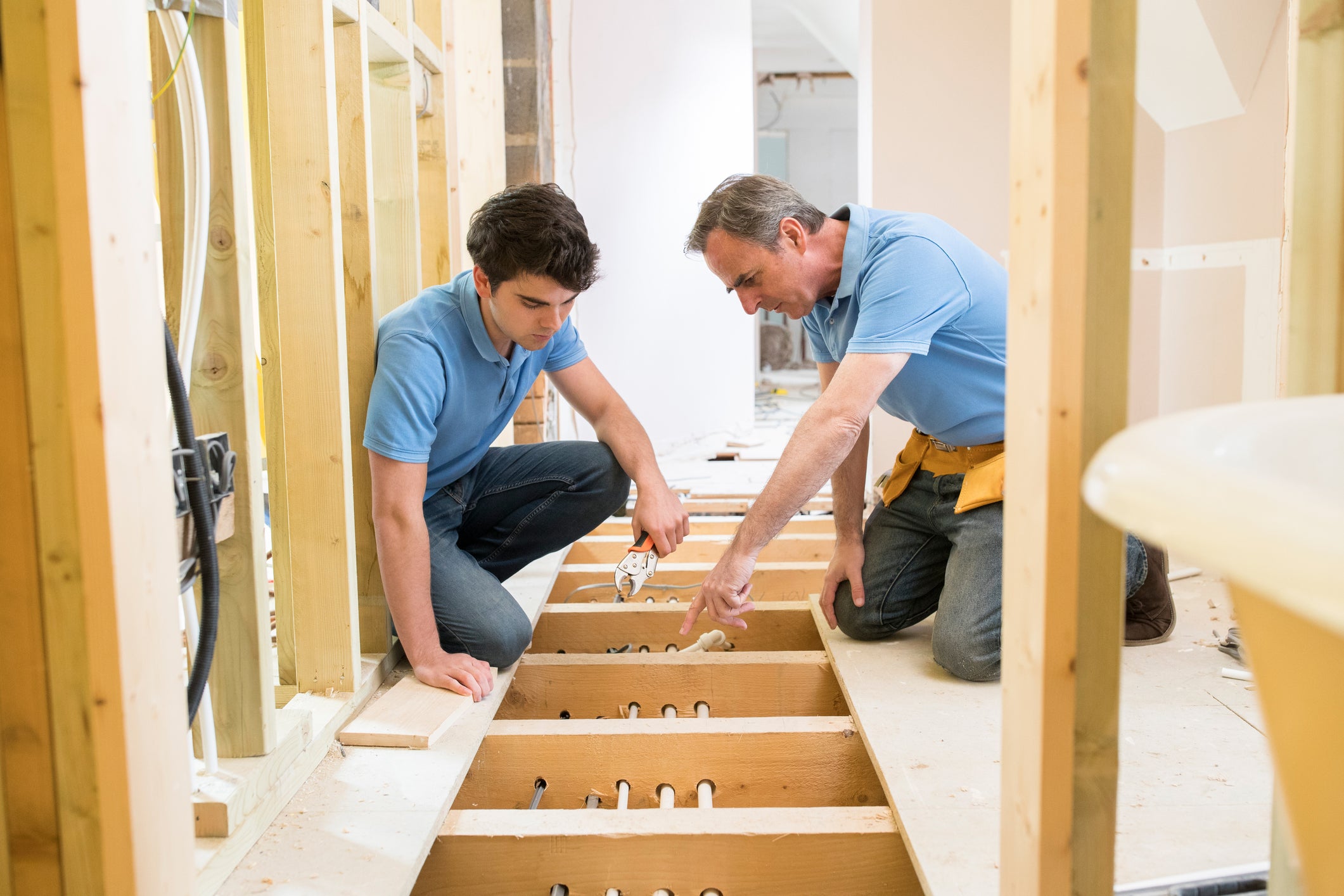What really needs to be done to tackle social mobility?
This is an issue about the equality of opportunity, not just ‘rising up’ from the working classes, the government needs to understand this if anything is to change, writes Hannah Fearn


When Louise Gibson was a child growing up in North Wales four decades ago, the concept of social mobility was, to her, a very simple one. Gibson’s family was based in Connah’s Quay, a small community which relied heavily on the steelworks, with whole family economies based on the work they provided. When they closed, the town was hit hard.
“My parents and their parents before them were working class, and they would often say proudly so,” she says. “For them, and so for me as a child, social mobility was about having a better lifestyle than the previous generation. That translated into earning more, having a bigger house, not working in a manual labour job, getting qualifications.”
So Gibson’s parents championed education as the route to a better life, and she worked hard at school, describing herself as excelling academically. Both she and her parents saw there could be a path away from working on factory production lines, and that path was cleared by education: first A-Levels, then university, and finally an “office-based job”. She shared her parents’ desire for her to break away from the small Welsh town in which her life began. In her words: “I couldn’t see opportunities there which matched my ambitions.”
Gibson is now 48 and a marketing professional living in Sheffield. Her life has indeed been characterised by upward mobility from the working to the middle classes. When the government talks about social mobility, it should be stories like hers they want to tap into. Her successes, they would like to argue, could be shared by any person who takes hold of the opportunities presented in exactly the same way.
Should they wish to do that, however, they won’t find Gibson a useful talking head. Rather than feel a sense of pride, her feelings about her trajectory and what social mobility really means are more complicated. Now, that term – “social mobility” – signifies something rather different to her. “I personally think the term is negative, literally to move socially and the insinuation is that the movement is up, as if starting from a lower socioeconomic background is negative, as if those people are somehow lesser,” she says. “True social mobility is about inclusion and equitable opportunities, and consideration by others regardless of background.”
Gibson’s own life story was made possible because her parents supported her ambitions. “None of my peers had this,” she tells me. She also benefitted from entering university in 1992 when she was still able to claim a grant for studying and did not have to pay tuition fees like the tens of thousands of pounds of debt students today amass. Even still, education is itself not enough to secure an upward climb, particularly socially.

As Gibson says: “The reality is that even if a person gains a good education or has a career which sees them in perceived middle-class roles earning above-average income they will still face stigma because of their background. It’s impossible for a person to grow up in a lower socioeconomic/working-class household and not be personally affected by that even if they are socially mobile.”
So is this limitation a reflection on the impossibility of making social mobility work, or simply a sign that government policy isn’t working – and hasn’t worked for many years now?
Last month the government’s social mobility tsar, Katharine Birbalsingh, headteacher at the Michaela Community School in Wembley Park, London, caused an outcry among some people when she delivered a speech which appeared to me to accept the latter: that there were limits to what could be achieved. Her controversial remarks emphasised the need to highlight small successes, such as the child of a family with a history of long-term, intergenerational unemployment securing stable work as, say, a supermarket manager.
How far has the government generally taken notice of the work I and other sociologists have done? The answer to that question is scarcely at all
Of course, Birbalsingh is right that those small leaps should be celebrated – nobody has, in fact, ever argued otherwise – but if this is the focus of social mobility policy for government, then it is missing the big picture.
What has become known as bottom-to-top social mobility does matter because it happens so rarely, and the cultural barriers that are not resolved by access to education remain entirely unsolved. When, then, does the government want to focus on something else entirely? Many have drawn their own conclusions.
A sensible starting point is the data on existing mobility: what does it tell us about Birbalsingh’s priorities? According to British sociologist John Goldthorpe, who has dedicated his academic career to tracking, understanding and promoting social mobility, it highlights exactly how misguided they are. “I read the recent speech and that had a lot of rhetoric and a good deal of self-promotion but analytically it was very weak and showed no knowledge of the basic research on social mobility,” he claims.
Goldthrope describes Birbalsingh’s position as “especially disappointing” for focusing on what he calls “short-range mobility”. “All the evidence shows that, in the middle structures, there is a lot of mobility. There always has been. I don’t think that’s a big problem. What better vocational training [which she argued for] might do is to increase productivity, but I don’t think it will have any effect on short-range mobility – which, in any case, is at quite a high level. The real problem is long-range mobility: that’s where the inequality of opportunities shows up in a gross way.”

He believes the position of government represents a decline in ambition for change. As a result, he and his colleagues have decided to step back from advising the Social Mobility Commission at all, bemoaning its lack of confidence and radicalism in addressing the problem using the evidence as a starting point.
Goldthorpe’s decision to walk away was an easy one for him. “How far has the government generally taken notice of the work I and other sociologists have done? The answer to that question is scarcely at all.” But it is a huge loss for the government and the commission. The lack of expertise around the social mobility commission only serves to expose the disconnect between discussion of social mobility in political and public circles, and the actual results of sociological inquiry.
One important missing factor is the distinction between absolute and relative social mobility. They are very different things. Absolute mobility refers to the proportion of people who have, by their middle age or later lives, moved from the class or economic circumstances of their origins; for most people just means they’ve managed to achieve a better standard of living or a higher income than their parents had when they were in school. Or, of course, the reverse.

The data shows that over the last several decades the total proportion of people making that sort of move is quite constant. In this sense, there has been no decline in social mobility at all in the recent past. However, what was once a largely upward picture, with tens of thousands steadily moving upward in the post-war years, what we’re seeing now is a general trend towards a downward shift. With the immediate cost of living crisis, a period of stagflation now highly likely and the devastating impact of a highly unaffordable housing market on younger people, that picture is only set to continue. Of course, nobody wants to talk about that. When politicians discuss social mobility, they only want it to travel in one direction.
Relative social mobility, however, is something else entirely. It charts the differences in chances for the mobility of different class backgrounds. We might instead call it equality of opportunity. Just because we have absolute mobility doesn’t mean we have relative mobility. In fact, we simply do not. Most ordinary people know and understand this; many have seen it in action in their own lives, whether it’s a missed promotion at work because of a perceived lack of “finesse” (a regional accent, or the wrong clothes, perhaps) or witnessed in public life the way the privileged are able to hang on to positions of power and security whatever their abilities.
The inevitable consequence of greater equality of opportunity is the one thing that politicians don’t want to discuss: downward mobility. As Goldthorpe says: “It’s just a simple mathematical fact that if you were to manage to weaken this inherent association between parents class position and children’s class position you must increase downward mobility. This is the point that politicians don’t want to recognise.” No wonder the social mobility tsar shows no willingness to discuss this thorny problem in public.
The reason why educational reform and policy don’t help very much is that parents in more advantaged class positions will not be passive, they will use their resources
Between the wars, in what has been labelled the “Golden Age” of social mobility, a large upward thrust was possible not only because of a government commitment to expanding education, but because of the other social and political shifts happening at the time. The rise in white-collar work, the vast expansion of the welfare state and the creation of the health service, created a huge number of new professional jobs. And unlike today, these rules were not already held by middle-class incumbents: there was little competition for them. Easy, then, for educated working-class children with the right attributes to fill them, giving their life chances a significant boost.
When politicians talk about social mobility, this is the sort of progress they want to see – but, right now, the jobs aren’t there. The growth of what might be called “top-end jobs” is in decline, and the decline in jobs at the lower end of the economic scale has also slowed down. Proportionately, there are now more new working-class jobs opening up – think of the rate of expansion of coffee shops and the British high street, for example, and the growth of gig economy delivery shifts. You can invest in better education all you like, but it won’t result in a material change in the relative mobility of working-class young people in an economy like this.
Goldthorpe explains: “The reason why educational reform and policy don’t help very much is that parents in more advantaged class positions will not be passive, they will use their resources to do the best they can for their children. Look what’s happened in the last 20 years: most secondary education is now comprehensive, and, obviously, very well-off parents resort to the private sector, but there’s an increasing swathe of other parents who use the state sector but pay for private tutoring.”
Writer and community campaigner Duncan Exley – himself a product of social mobility, but who too finds the political arguments surrounding it very hard to relate to – described the same phenomenon while researching his book, The End of Aspiration? “Not only can the more privileged people pay to load the dice, pay for a house in the area of a good school, but they can also pay to have another throw of the dice, and another, and another. They’ve got a lot of money to keep throwing,” he says. “If you’re looking at getting working-class people into middle-class jobs, then the middle-class people are going to fight like hell to make sure it’s their kids who keep them. Whereas if it’s new jobs opening up you’re not having to fight off an incumbent.”

And cling on tight us what the middle classes seem to do. That’s why those who have broken through economically may still find they struggle socially to adjust to their peers. For the novelist Heidi James, herself a social mobility success story, cultural norms and expectations are far more important in influencing social mobility and life chances than the education achieved, or even the bald financial standing at which a child starts. “These hierarchies of status just maintain the same old, same old,” she argues. Why, she asks, do we value some professions and jobs more highly than others, however critical they are to the economy? “The pandemic and the rail strikes demonstrate just how important those roles are. It’s about more than money, certainly in the UK,” she says.
James, who is the author of the critically acclaimed novel The Sound Mirror, was born to a teenage, single mum and grew up alongside her grandparents. She was considered academic and bright “in a way that conformed to expectations, both at home and at school,” and so the family supported her in the traditional ways that once worked: buying books, taking her to the library, encouraging her to ask questions and have aspirations for herself. “The whole family clubbed together to buy the ridiculous uniform for grammar school,” she says. “I was even encouraged to speak differently: to not drop consonants or use the local idiom [or] vernacular.”
All this, though, still came with its drawbacks. “As I got older my vocabulary would upset my mother. She felt I was ‘full of myself’ calling me ‘Lady Muck’ and that I was ashamed of my background.” James later dropped out of grammar school without any A-Levels, and only later went on to get a degree and a PhD, and forge a successful career in the arts. Even that didn’t make her immune from the cultural hang-ups of the British class system: “I’ve had colleagues mock my accent, affecting an exaggerated cockney/estuary accent when speaking to me. For a long time, I felt shame and a class double consciousness.”

Education is part of the story, clearly, but it is not the panacea that the government pretends it is. Bluntly, if you educate and encourage an aspirational working-class child, they need a middle-class job to go into. Today, there are thousands of graduates working in non-graduate roles because the development of the economy has not kept up with successive governments’ push for higher engagement in tertiary education.
What is lacking, according to both Exley and Goldthorpe, is a modern industrial strategy to support social mobility. Providing a new generation of professional opportunities in industries which would support an evolving, low-carbon economy is certainly possible. Among the Conservatives, both Michael Heseltine and Theresa May set out ideas and strategies on just this matter, but under Boris Johnson’s government, those ideas seem to have withered to nothing. Sociologists including Goldthorpe made the case to government that in areas such as preschool education, youth services, the probation and prison sector and services for the elderly, such a move would be highly beneficial to society – as well as bringing great progress in absolute social mobility with it. It was ignored. Instead, we now have both a productivity crisis and no industrial strategy at all.
Where are the government going wrong? Goodhead thinks it’s the failure to accept that equality is directly linked to social mobility which is the stumbling block
Removing the toxic debate around social mobility might be a first step. For Exley, that’s absolutely necessary. “It’s really unhelpful how politicised it is talking about social mobility,” he says. “You get people on the right saying it’s all about whether an individual wants it or not, ‘pull yourself up by your boostraps’. And then there’s a more left-wing view that it’s all about structures. And of course you can’t, if the thing is loaded against you.”
Where Exley agrees with Birbalsingh is that social mobility shouldn’t only be considered of value if it involves a complete move from the bottom to the top economic strata of society. “I think social mobility is basically that you can go to wherever you want to be, regardless of where you started from. If your dad was a plumber and you want to be a plumber, brilliant – but if you want to become prime minister or something, fine, that’s good too. It shouldn’t be about setting those things against each other. It should mean that you can go wherever you want.”
For those who have already achieved some mobility, that position may feel within reach for their own children. In Sheffield, Gibson, now says she still feels very connected to her working-class heritage even though she lives in a middle-class world. “I recognise the privilege this affords me and my family and that my social mobility will probably make a positive difference to my children in terms of how they’re treated in future,” she admits. Those children still in north Wales may not have the same changes. They are not there yet. There is a long way to go and no clear policy to get us there.

It’s frustrating for campaigners on these issues such as Cerisse Goodhead of the Equality Trust, who dismisses the latest efforts from the Social Mobility Commission as a “tick box exercise”. She sounds resigned as she reflects on where we are now: “We see too many people being held back by the circumstances of their birth which is unfair and unjust. People born into wealth continue to occupy powerful positions.”
Where are the government going wrong? Goodhead thinks it’s the failure to accept that equality is directly linked to social mobility which is the stumbling block. The pandemic has demonstrated how unequal the UK really is – think of the wealthy child able to study at home through lockdown with high-speed internet access and a personal laptop, along with a hired private tutor, while a poorer child lacks even basic access to online resources. But policies across the board don’t recognise this. Goodhead is particularly incensed, for example, by the decision to offer a universal energy cost rebate, rather than targeting the funding to those hit hardest by the cost of living crisis.
But change may be on the horizon, because opinion polling suggests that the public are now ahead of the government on this matter. According to the Sutton Trust, in 2008 more than half of the British population believed we had achieved equality of opportunity. Now it is down to around 35 per cent. Social mobility is under scrutiny, and the experiences of the pandemic have shone a forensic light up on it – although it’s now no longer possible to extrapolate what will happen in the future from the experiences of the past.
The Covid-19 pandemic, however, means there are reasons to be hopeful that change is afoot. Professor Anna Mountford-Zimdars heads up the University of Exeter’s centre for social mobility. Her research points to moments of genuine progress in the last two years: people with disabilities and mental health difficulties have found it easier to access remote schooling or tertiary education, narrowing the attainment gap, for example. Collectively, we may not yet have learned the lessons of the pandemic but the discussion around social mobility is a great chance to do that. In particular, abandoning the focus on equality of opportunity and looking specifically at outcomes – as other countries, particularly the Nordic outliers already do – would be a good starting point, she says.
Above all, Mountford-Zimdars calls for some positivity to be injected into the politics of mobility. “There’s still an opportunity to really reframe and think about what other things people have learned that they didn’t have before; how can we turn these into positives? I think this whole discourse of everything going down the toilet isn’t helping anyone.”




Join our commenting forum
Join thought-provoking conversations, follow other Independent readers and see their replies
Comments